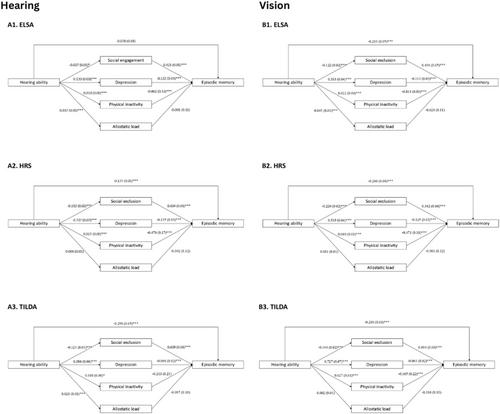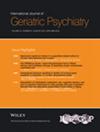What Explains the Link Between Hearing and Vision Impairment and Cognitive Function? Analysis of Mediating Effects in the USA, England and Ireland
Abstract
Objectives
Hearing and vision impairments are associated with cognitive decline and dementia risk. Explanations for this include age-related processes impacting on sensory and cognitive function (common cause), or sensory impairments having a direct or indirect impact on cognition via social engagement, depression and physical activity (cascade). We tested whether associations between hearing, vision and episodic memory were mediated by allostatic load, social engagement, depression and physical activity.
Methods
We used structural equation modelling with cross-sectional data from the USA (n = 4746, aged 50–101), England (n = 4907, aged 50–89) and Ireland (4292, aged 50–80) to model factors related to the common cause (indexed by allostatic load) and the cascade hypothesis with respect to cognitive ability (episodic memory).
Results
Poorer hearing/vision was associated with lower social engagement, depression and sedentary lifestyle. Poor vision was not related to allostatic load, and poor hearing was associated with allostatic load in only one data set, contributing to a common-cause hypothesis. Lower social engagement, depression and a sedentary lifestyle were associated with poorer episodic memory, contributing to the cascade hypothesis. Using effect estimates to calculate the proportion of the total effects mediated by the combined mediator variables, up to two fifths of the relationship between hearing and vision with episodic memory can be explained by the mediators.
Conclusions
The association between hearing, vision and episodic memory is mediated by allostatic load, social engagement, depression, and physical activity. The finding that social engagement, depression, and physical activity mediate the association between sensory abilities and cognitive function supported the cascade hypotheses. Interventions to improve healthy lifestyle, reduce depression and foster social engagement of older people with sensory impairments are likely to be beneficial in preventing cognitive decline and dementia.


 求助内容:
求助内容: 应助结果提醒方式:
应助结果提醒方式:


